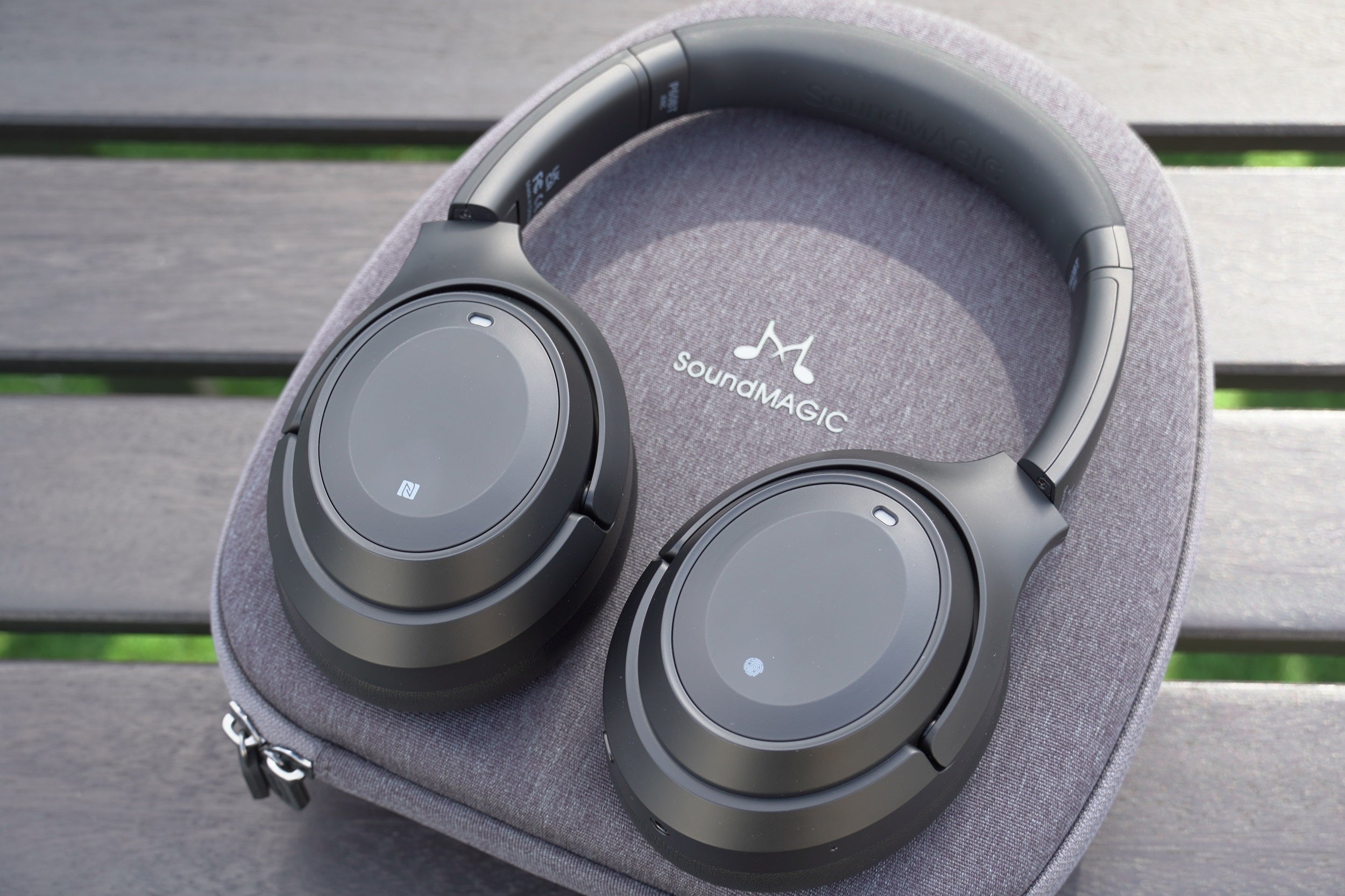Sony WF-1000XM5 Review
A new design but are Sony's flagship true wireless better than before?






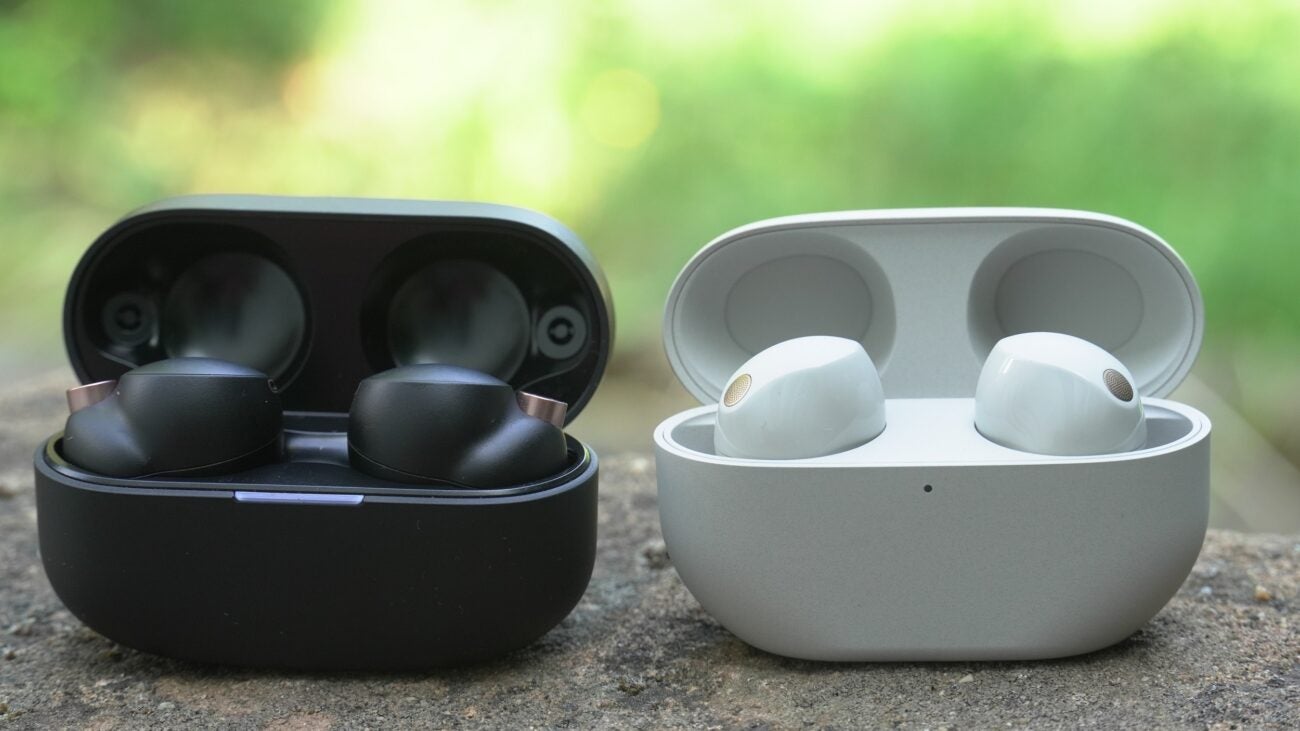

Verdict
The WF-1000XM5 is another excellent headphone from Sony that represents a step forward for its true wireless series. An improved design leads to better comfort levels, the noise-cancellation is better, they come with a bevy of smart features and an audio performance that’s clearer and more detailed than before.
Pros
- Smaller, lighter design
- Powerful noise-cancellation
- More detailed, balanced audio performance
- Plenty of smart, convenient features
Cons
- Bose a smidge better for ANC
- Slightly odd call performance
Availability
- UKRRP: £259
- USARRP: $299.99
- EuropeRRP: €320
- CanadaTBC
- AustraliaTBC
Key Features
- HD Noise Cancelling Processor QN2eNew processor to handle noise-cancellation
- Dynamic Driver X Designed to reproduce a wide frequency range
- IPX4 ratingProtected against splashes of water and sweat
Introduction
The WF-1000XM5 are the fourth iteration of Sony’s popular true wireless series, boasting the best-ever noise-cancelling performance (their words, not mine), their best-ever call quality and improved audio.
The WF-1000XM4 were (and are) big favourites on this site, regularly at or near the top of our best buy lists but the competition has become stronger since they launched. Plenty of other wireless earbuds took a leaf out of the WF-1000XM4’s playbook – if you’re at the head of the pack then you’re the one being chased after all.
The competition has caught up with Sony’s true wireless models in several ways, and the WF-1000XM5 are about to do battle with the likes of Bose, Sennheiser, and Apple. Can it deliver a knockout punch?
Design
- Smaller, lighter than WF-1000XM4
- Improved fit
- Easy to operate
A key to predicting the direction Sony goes in with its flagship headphones is to look at the ones that came out just before, as if the engineers at Sony Tokyo have been testing and refining the concept.
For instance, with the LinkBuds S and WF-C700N launching in the months before, the mood board for the WF-1000XM5 likely consisted of the words ‘smaller’ and ‘lighter’. Side-to-side, the WF-1000XM4 are the bigger, chunkier, stockier heavyweights to the flyweight WF-1000XM5, with Sony reducing their size by 25% and their weight by 20%.
This brings positive news in terms of the fit. Many complained about the constant ‘presence’ of the WF-1000XM4, and while it’s not as if the WF-1000XM5 ‘disappear’, the bulge is less pronounced, and I find the comfort levels are better.
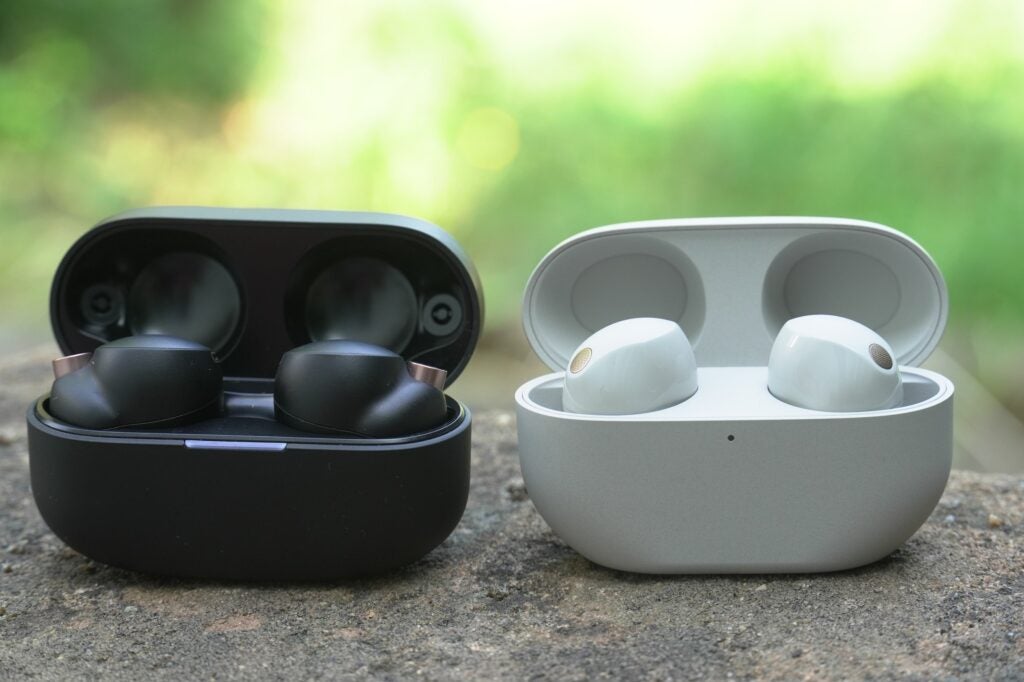
More ear-tips are provided this time around, with an extra small joining small, medium, and large alternatives to help find a better fit and seal. The earphones are rated IPX4 to protect against water and sweat, while the case doesn’t appear to have a rating.
The feel of the earphones’ housing is glossier than before – the XM5 doesn’t quite have the tactile feel of its predecessor – but I haven’t had any issues operating the headphones, thanks to a little feedback sound that acknowledges a successful jab at the controls.
Touch controls cover virtually everything you’d need, from playback, switching between noise-cancellation modes, skipping tracks, and volume control (via multiple taps).
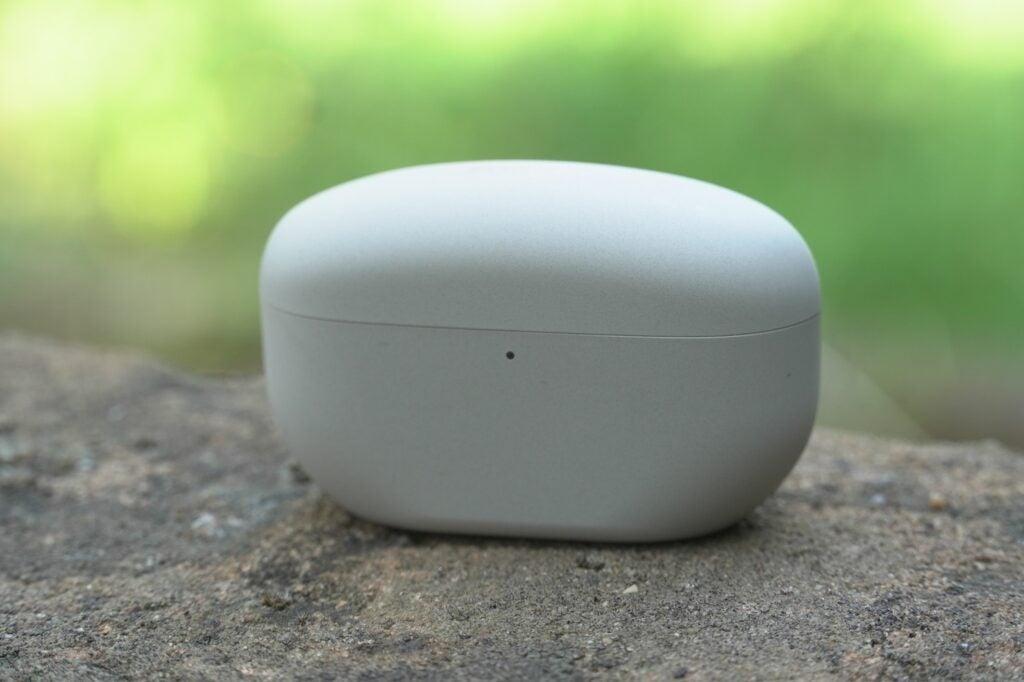
Like the earphones, the charging case is more compact and slimmer. All these trims make the case more pocketable, though I do find that re-inserting the earphones can be fiddly to get them to settle in the cradle.
The LED indicator on the front is smaller but still noticeable, showing the various charge levels of the case. A USB-C port for charging is on the back, alongside a button to put the earphones into pairing mode. Colours, at least at launch, are black and white options. Here’s hoping there are more colours down the line.
Features
- Powerful noise-cancellation
- Pretty solid call performance
- Feature-rich offering
Rather than go through all the features in detail – if I did then this review might never end – I’ll summarise what’s been carried over and go into more depth on what’s new. The Sony WF-1000XM5 remains one of the most feature-packed and smart true wireless pairs available.
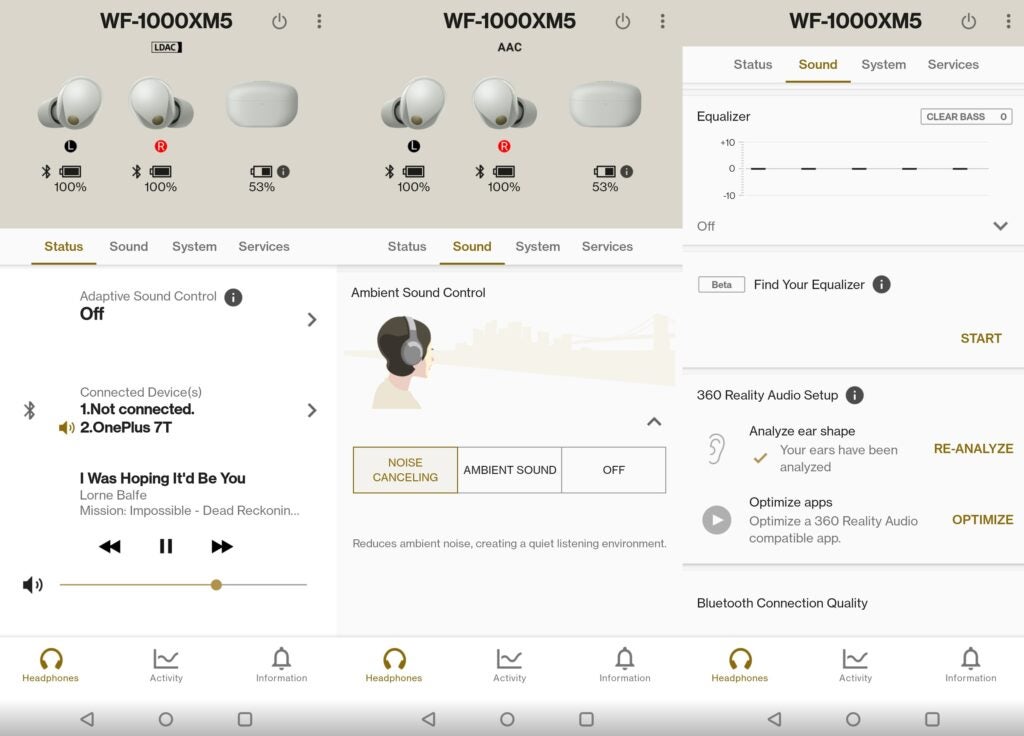
Carried over from the WF-1000XM4 is Quick Attention Mode (for when you want to briefly hear what’s around you), Speak to Chat (that detects when you’re talking and pauses music automatically), Adaptive Sound Control (where you can geo ringfence an area and set the earbuds to automatically alter the noise-cancelling performance).
Alexa and Google voice control are both supported, as is Google Fast Pair with Android devices and Swift Pair for Windows. The optimal ear-tip test carries over in the Headphones Connect app, and DSEE Extreme upscales compressed tracks back to their full dynamic range.
You can customise touch controls, noise-cancellation (via Ambient Sound Control settings), Bluetooth Connection (prioritise audio quality or wireless connection), equaliser presets, and control playback in the app. Bluetooth multipoint is supported for simultaneous operation with two devices, and there’s auto pause when an earphone is plucked from the ear.

Transported from the LinkBuds series are the ‘Service Link’ features such as Spotify Tap that opens the app, an album, or a playlist (whatever you assign to it). The Endel Quick Access feature offers personalised soundscapes to help the wearer focus, relax, or sleep. This comes with a free trial for first-time users but once over it requires a subscription.
What’s new? There’s a Find Your Equaliser setting where instead of selecting from presets, you play music and shape the sound from a series of options to find a preference. With calls you can hear your own voice as you’re talking but if you find it distracting, it can be turned off.
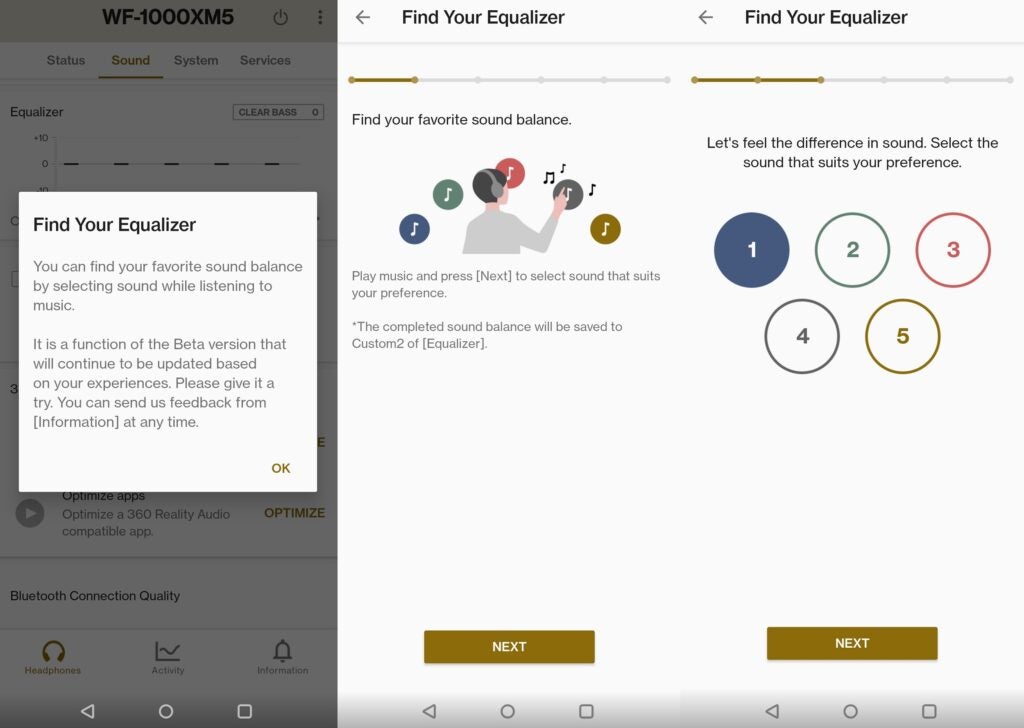
Head gesture control is supported with calls so you can accept a call by nodding or reject it by shaking your head like the Bragi Moves controls on the Klipsch T5 II ANC. 360 Reality Audio supports head tracking, so people’s voices/instruments can shift around as you move your head when listening to immersive 360 RA tracks.
It’s not necessarily a case of totting up the feature count (though it helps), it’s the spread of the features that’s most impressive, able to fit into whatever your daily routine is. In my years of reviewing headphones, I haven’t come across a pair as feature-rich as the WF-1000XM5.
But wait, there’s more! Bluetooth connectivity is the 5.3 version with support for SBC, AAC, and the higher quality LDAC (only useful for Android users). The WF-1000XM5 follows in the footsteps of the Technics EAH-AZ80 by supporting Bluetooth multipoint and LDAC playback at the same time.

The wireless performance is like the WF-1000XM4. With the headphones set to prioritise Bluetooth connection, there were no blips (though audio streaming is downgraded to AAC). With it set to prioritise sound quality (LDAC), there was some break-up whilst walking through Waterloo train station but not much more than that. Through Piccadilly Circus, Soho, Leicester Square and Victoria train station, the Bluetooth performance was consistent aside from a few blips every now and then.
Battery life figures hit eight hours from the earphones and 24-hours from the charging case in total with noise-cancellation on. With the battery drain test I conducted at 50% volume with a Spotify playlist, the battery fell by 10% across two hours but I believe this was with noise-cancellation off (I hadn’t been given access to the beta app by this time). Another attempt saw one of the buds switch off. I’ll update this review once I can vouch for the figures.
A three-minute charge adds an extra hour of playback, and there’s support for wireless charging either through a Qi charging pad or by placing it on the back of a compatible Xperia smartphone.
Sony’s claiming the call quality for the WF-1000XM5 is its best-ever for a true wireless. Like the WF-1000XM4 it uses a bone conduction sensor but now also uses a noise reduction engine (that uses AI machine learning) and a wind noise reduction structure.
The results are fairly strong but also a little odd. Vocal pick-up and clarity are good, but the person on the other end mentioned the headphones picked up background noise whenever I spoke but was dead silent when I wasn’t speaking. While background sounds were muffled when I was talking, wind noise made it harder for my voice to come through.
Sony is (once again) claiming industry leading noise-cancellation from the WF-1000XM5, though look closer and it is a self-anointed claim through the company’s own research.

The new earphones (allegedly) reduce approximately 20% more noise than the WF-1000XM4, and after my own personal testing, I wouldn’t dispute those claims. The noise-cancellation is better at suppressing general noise and people’s voices. A tell-tale sign for how powerful noise-cancellation can be is when I take the earphones out and am greeted by a wall of sound – it shows how much noise is blocked and that’s the effect I had with the WF-1000XM5.
Swapping between the XM5 and XM4 in Piccadilly Circus – the XM5 were noticeably quieter, ushering in a better sense of solitude, squashing (though not entirely removing) the sound from a nearby performer’s speaker, while the hubbub from the crowd was much calmer and higher frequency sounds were ably dulled. It had the same effect on public transport, whether on a bus, train, or the Underground, and in the latter case wind noise was much more effectively coped with.
On the question of whether the Sony WF-1000XM5 are the best noise-cancelling earbuds, I would say… not quite. Compared to the QuietComfort Earbuds II, the Bose squashes conversations with a little more precision, and ambient noises feel as if they’re pushed further away. Both are impressively quiet, though if it’s any consolation the Sony applies a more natural-sounding noise-cancelling tone than the Bose.
The transparency mode closely mirrors the performance of the WF-1000XM4, filtering in the surroundings loudly and clearly, with voices filtered through naturally. I might give the edge to the XM4 in terms of overall clarity but there’s not much in it.
Sound Quality
- Clearer performance with high frequencies than XM4
- More detail and definition across the frequency range
- Not quite as bassy as before
It’s all change on the driver front for the WF-1000XM5, employing the new Dynamic Driver X which is meant to aid wider frequency reproduction with low distortion.
With each new generation of Sony true wireless, I keep thinking there’s not much room to manouevre but the WF-1000XM5 show that there is room to play. The Cliff Notes are that the latest buds sound more balanced across the frequency range, ushering in more clarity with high frequencies.
You could listen to these earphones at default volume levels, but the performance largely feels sedate.
Raise the volume and they flex their muscles with more confidence. More to the point, a Spotify Premium subscription is fine but won’t extract the best performance. Put them in their LDAC mode and tee yourself up with a Tidal, Qobuz, or Amazon Music Unlimited sub.

The richness and warmth of the WF-1000XM4 has been tweaked for a sound that’s more balanced than I anticipated. I can hear that trait most in the midrange of Noah Cyrus’ Noah (Stand Still), the smoothness of her vocal performance with the XM4 is now a few fractions defter and detailed on the XM5. It doesn’t occupy quite as big a space in the soundstage either, but that slight tweak provides more of a focus on the lyrics.
The WF-1000XM5’s move towards a slightly more balanced presentation means it’s not as boisterous as before, the richness to the bass in Kendrick Lamar’s These Walls is replaced by a more measured take: less depth and outright power but punch in tone; not described in quite the same large terms but characterised with more clarity and definition.
Bass is not as prodigious – bass lovers might be a little disappointed by this change, but in terms of the overall balance, it may be more accurately conveyed and certainly doesn’t spoil the midrange or highs.
With Highway to the Anger Zone from The Batman soundtrack, the whole frequency range takes on a clearer, more defined approach. The punch of the percussion is not as powerful but sounds a tad more natural; the swell of violins have a clarity that’s more pronounced than on the XM4 where they felt a little masked.
With this and another orchestral track (Chasing Grace from the Dead Reckoning soundtrack), there’s a palpable increase in overall detail and definition that at times can leave the XM4 sounding muddier by contrast, but it’s with high frequencies that, for me, the WF-1000XM5 offers the most notable improvement.

They’re not the brightest-sounding pair of buds, seemingly unconcerned with being overly sharp, but with GoGo Penguin’s Raven there’s a touch more zest and detail found in the reproduction of the piano notes.
With the Fission track from the Oppenheimer soundtrack, I can hear the violin with extra clarity, the notes played more delicately than on the WF-1000XM4 – in other tracks there’s an extra crispness prevalent that is missing on the previous bud.
Elsewhere its sense of dynamism remains excellent, shifting gears from quiet to loud and vice versa easily (Oppenheimer’s Can You Hear The Music). Rhythmically it’s no slouch either – if anything the extra clarity affords the WF-1000XM5 to be more effective – and the soundstage is just as wide but better defined.
The WF-1000XM4 remains an excellent, musical pair of true wireless earphones, and with the WF-1000XM5, Sony has eked out an even better, clearer performance.
Latest deals
Should you buy it?
You disliked the WF-1000XM4’s fit: There were more than a few who felt the WF-1000XM4 was bulky. The WF-1000XM5 remedies that with a lighter, smaller, and more comfortable design.
If you want the best noise-cancellation: I would say the Bose QuietComfort Earbuds II offer the best ANC. But if it’s any consolation, the WF-1000XM5 sounds more natural with its noise-cancellation.
Final Thoughts
It’s perhaps a bore to write but the WF-1000XM5 are evolution over revolution. If you’re expecting a massive leap forward, then perhaps dial down your expectations.
If you want a definitive statement as to whether the WF-1000XM5 surpasses the WF-1000XM4 then yes, they’re better in virtually every way.
The changes to the design make for a more comfortable listening experience, the noise-cancellation is an improvement on before and the sound is a clearer, more detailed, and more defined.
At £259, the mark-up isn’t as big as I was informed it would be (£280). In my mind there’s no true wireless as conveniently smart, feature-rich or sounds better than the WF-1000XM5. Though if you ask me, the Bose QuietComfort Earbuds II have the edge with noise-cancellation.
How we test
We test every set of headphones we review thoroughly over an extended period of time. We use industry standard tests to compare features properly. We’ll always tell you what we find. We never, ever, accept money to review a product.
Find out more about how we test in our ethics policy.
Tested for a month
Tested with real world use
Battery drain performed
FAQs
The WF-1000XM5 are available to purchase from August 2023 onwards.

